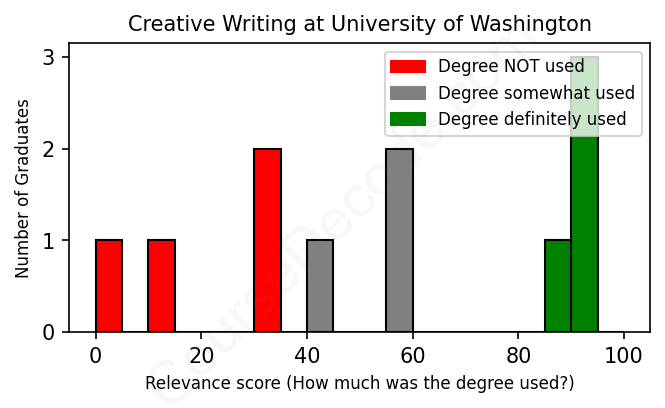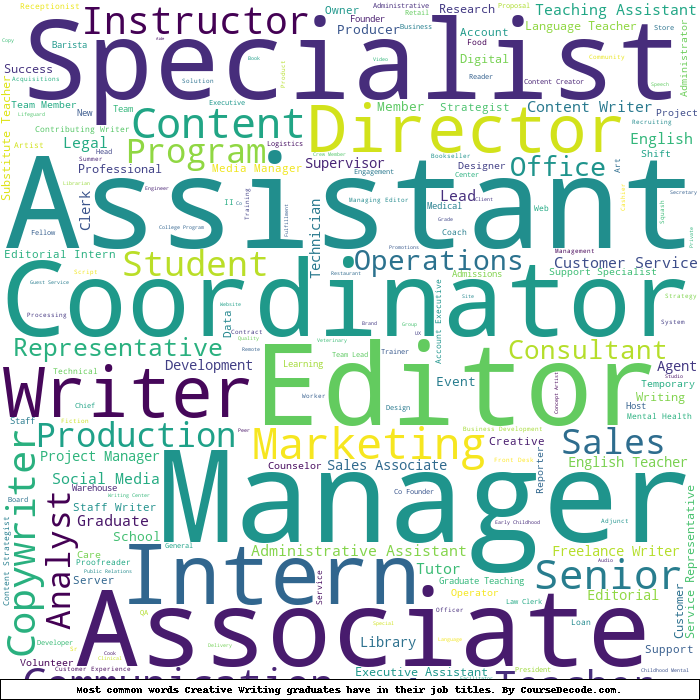
First, some facts. Of the Creative Writing graduates from University of Washington we've analyzed , here's how many have used (or NOT used) their degree in their career:

These are estimates based on AI analysis of 11 LinkedIn profiles (see below).
The verdict? Significantly below average. Overall, with an average relevance score of 53%, Creative Writing graduates from University of Washington have a much lower likelihood (-14%) of finding work in this field compared to the average graduate across all fields:
And for comparison, here's the chart for all profiles we've looked at across all degrees.
Also, after graduating, 36% of these graduates have pursued further education other than another Bachelor's degree (such as a Masters degree or other), compared to the average across all profiles of 35%. This suggests you may need more than just a Bachelors degree to be competitive as a Creative Writing graduate.
See the details:
|
Relevance score: 94% We think this person has gone into a career highly relevant to their degree. We think this person has gone into a career highly relevant to their degree.
DEGREE INFOGraduated in 2014 from University of Washington with a Bachelor of Arts (BA) in Creative Writing. No other secondary education since. JOB HISTORY SINCE GRADUATIONMedia Assistant University of Washington Jan 2014 - Jun 2014 Editorial Intern  Alaska Airlines Magazine Nov 2014 - Feb 2015 Blogger  Gelotte Hommas Architecture Jul 2015 - Oct 2015 Market Communication Manager  Product Creation Studio Sep 2015 - Jun 2016 Internationalization Writer  PicMonkey Apr 2016 - May 2016 Copywriter  PicMonkey Jun 2016 - May 2018 Content Strategist  PicMonkey Feb 2018 - May 2019 Content Designer  Meta May 2019 - Present ABOUTNo information provided. |
The top 10 most common jobs done by the graduates we've analyzed (ranked most common to least) are:
When looking at job paths for graduates of the Creative Writing program at the University of Washington, it’s clear that a mixed bag of careers emerges. Many alumni seem to have veered away from positions that directly involve creative writing, with numerous roles in sales, marketing, technical fields, and customer service. For instance, jobs like Mobile Sales Consultant Lead or Inbound Sales Administrator lean heavily on sales techniques rather than on writing competencies, showing a trend where graduates might take roles that don't directly align with their degree. A significant portion of graduates, though, has worked as freelancers, content writers, or in editing roles which, no surprise, utilize the skills they honed during their studies.
On the brighter side, some graduates have indeed found success in fields closely tied to their creative writing background, such as freelance writing, editing, or teaching English. Positions like Content Writer at Stripes39 or Senior Editor at Red Ventures directly reflect the skills learned in a Creative Writing program. Other relevant roles include teaching English, which keeps the focus on literature and communication that aligns with their degree. However, for every alumni taking on a writing-related position, there are several pursuing careers in areas that don’t capitalize on their Creative Writing training. Overall, while there are some clear connections to creative writing careers, many graduates are navigating pathways that don’t fully utilize their education, suggesting an opportunity for graduates to explore or create more writing-related employment opportunities.
Here is a visual representation of the most common words in job titles for Creative Writing graduates (this is across all Creative Writing graduates we've analyzed, not just those who went to University of Washington):

When looking at the career trajectories of Creative Writing graduates from the University of Washington, there's definitely a mixed bag. Many of the early job roles right after graduation don’t directly tie into writing or literature — we're seeing positions like sales consultants, grocery clerks, and even roles in food banks. This suggests that while not every grad lands a job in their field immediately, they do tend to find employment relatively quickly, even if it's in areas that seem unrelated to their degree.
Fast-forward about five to ten years, and the landscape starts to look a little more aligned with what you might expect from a Creative Writing background. Several graduates eventually move into writing, editing, or content strategy roles, which is promising! For instance, we've got people taking up freelancing or securing editorial positions. Even those who took a detour into other fields appear to find their way back to writing, demonstrating that skills from a Creative Writing degree can be versatile and applicable in various contexts. So, while the immediate post-grad experience might not scream “writer,” many alumni find a path to careers that resonate more with their studies and passions later on. It’s kind of a winding road, but it shows there's hope for those who love to write!
Getting a Bachelor’s degree in Creative Writing at the University of Washington can definitely be a challenge, but it’s not necessarily harder than other degrees. It’s a mix of honing your writing skills, studying literature, and lots of critiquing—not just your work, but your classmates’ too. You’ll spend a lot of time drafting, revising, and pushing your creative boundaries, which can be tough but also super rewarding if you love writing. It’s all about finding your voice and figuring out your style, so if you’re passionate about storytelling and ready to put in the effort, you’ll probably find it to be a fulfilling experience, though it can feel intense at times!
Most commonly, in the LinkedIn profiles we've looked at, it takes people 4 years to finish a Bachelor degree in Creative Writing.
Looking at the job histories of these University of Washington grads, it seems like there’s a mixed bag in terms of how much money they’re raking in. Some have snatched pretty cool roles in companies like Meta and have moved into solid positions like Content Strategist and Technical Account Manager, which likely come with decent paychecks. However, others are stuck in more entry-level gigs, like grocery clerks and substitutes, which usually don’t pay that well. Plus, a few of them have had a lot of freelancing or part-time roles, which can be hit-or-miss when it comes to stability and income. Overall, while some are doing alright, others might be still figuring out how to make the big bucks.
Here is a visual representation of the most common words seen in the "about" section of LinkedIn profiles who have a Bachelor degree in Creative Writing (this is across all Creative Writing graduates we've analyzed, not just those who went to University of Washington). This may or may not be useful:

Here are all colleges offering a Bachelor degree in Creative Writing (ordered by the average relevance score of their Creative Writing graduates, best to worst) where we have analyzed at least 10 of their graduates:
| College | Score | Count |
|---|---|---|
 University of Central Florida University of Central Florida
|
58 | 17 |
 Florida State University Florida State University
|
56 | 15 |
 Columbia College Chicago Columbia College Chicago
|
54 | 10 |
 University of Washington University of Washington
|
53 | 11 |
 University of California, Riverside University of California, Riverside
|
45 | 10 |
 Southern New Hampshire University Southern New Hampshire University
|
44 | 26 |
 Western Washington University Western Washington University
|
44 | 10 |
 Full Sail University Full Sail University
|
21 | 31 |